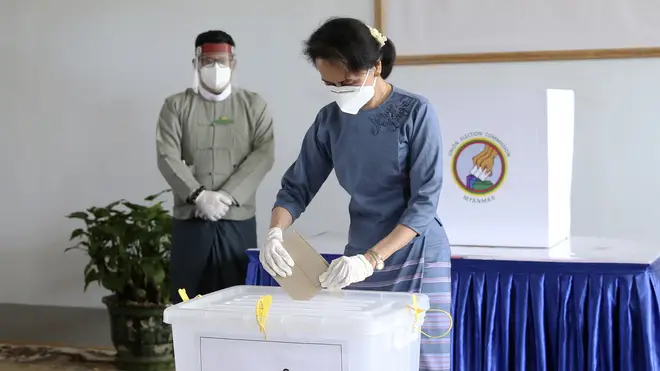
Lewis Goodall 10am - 12pm
29 October 2020, 07:24

She wore a mask and gloves as she voted amid an upsurge in coronavirus cases.
Burma’s leader Aung San Suu Kyi cast her ballot in advance voting for general elections that are taking place during a surge of coronavirus illnesses.
The Southeast Asian country confirmed almost 1,500 new cases of infection on Wednesday alone.
Ms Suu Kyi, whose title is state counsellor, and the country’s president, Win Myint, both wore masks and gloves as they voted in the capital Naypyitaw.
Measures are being taken to ensure social distancing at the polls on election day, November 8.
Advance voting is allowed and encouraged for citizens 60 years of age or older in areas where there are lock-down type restrictions because of coronavirus, and in cases where people are staying for work in places other than their official homes.
Ms Suu Kyi is 75 and the president is 68.

Tens of thousands of citizens living overseas have also already cast their ballots.
The election commission has ruled that the polls will be held on the planned date despite the coronavirus crisis in several areas, a decision endorsed by Ms Suu Kyi and her ruling National League for Democracy party.
At least two dozen other parties had urged postponement.
The commission has also cancelled voting in parts of Kachin state, Kayin state, Bago region, Mon state, Rakhine state, and Shan state, all of which are troubled by various levels of unrest.
The commission said free and fair voting could not be guaranteed in those areas, but the selective cancellation has drawn criticism.
The office of the UN High Commissioner for Human Rights said it had serious concerns about the human rights situation in Burma ahead of the elections, including violations of the right to political participation, particularly for minority groups.

“While the elections represent an important milestone in Burma’s democratic transition, the civic space is still marred by continuing restrictions of the freedoms of opinion, expression and access to information, and the use of language that could amount to incitement to discrimination, hostility and violence,” its statement said.
Burma has 37 million eligible voters, including five million first-time voters.
The last general election in 2015 brought to power Ms Suu Kyi’s National League for Democracy after more than five decades of military rule.
Ms Suu Kyi, a former political prisoner who won the Nobel Peace Prize for leading the non-violent pro-democracy movement, remains by far the country’s most popular politician.
The international condemnation of her government for allowing security forces to carry out widespread abuses of the Muslim Rohingya minority, driving more than 700,000 to seek safety in neighbouring Bangladesh, appeared to play no significant role in the campaign.
Even though Burma now has elections, a constitution enacted in 2008 while the military still held power gives the armed forces one-quarter of the seats in the lower and upper houses of the national parliament, giving them veto power over any changes to the charter.